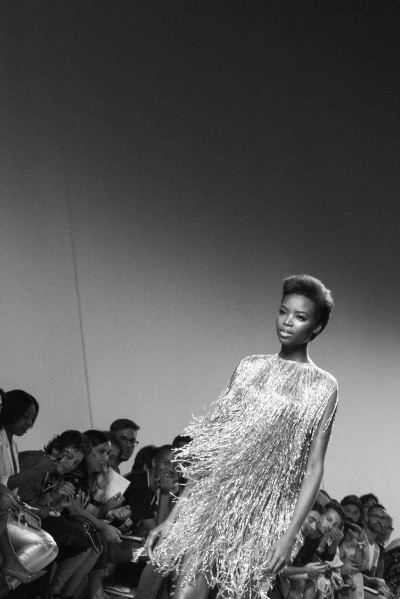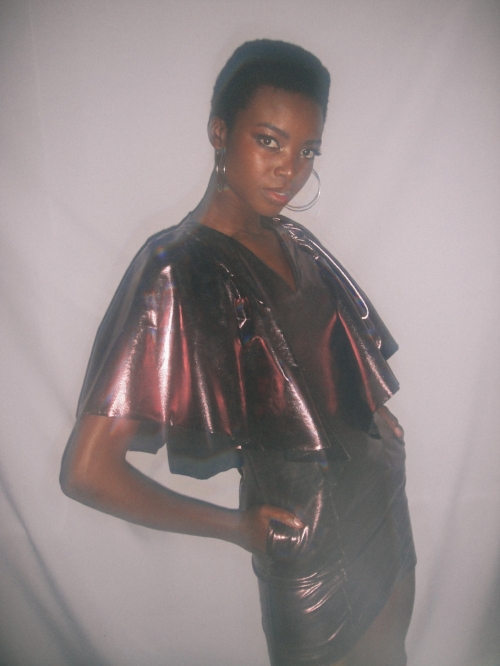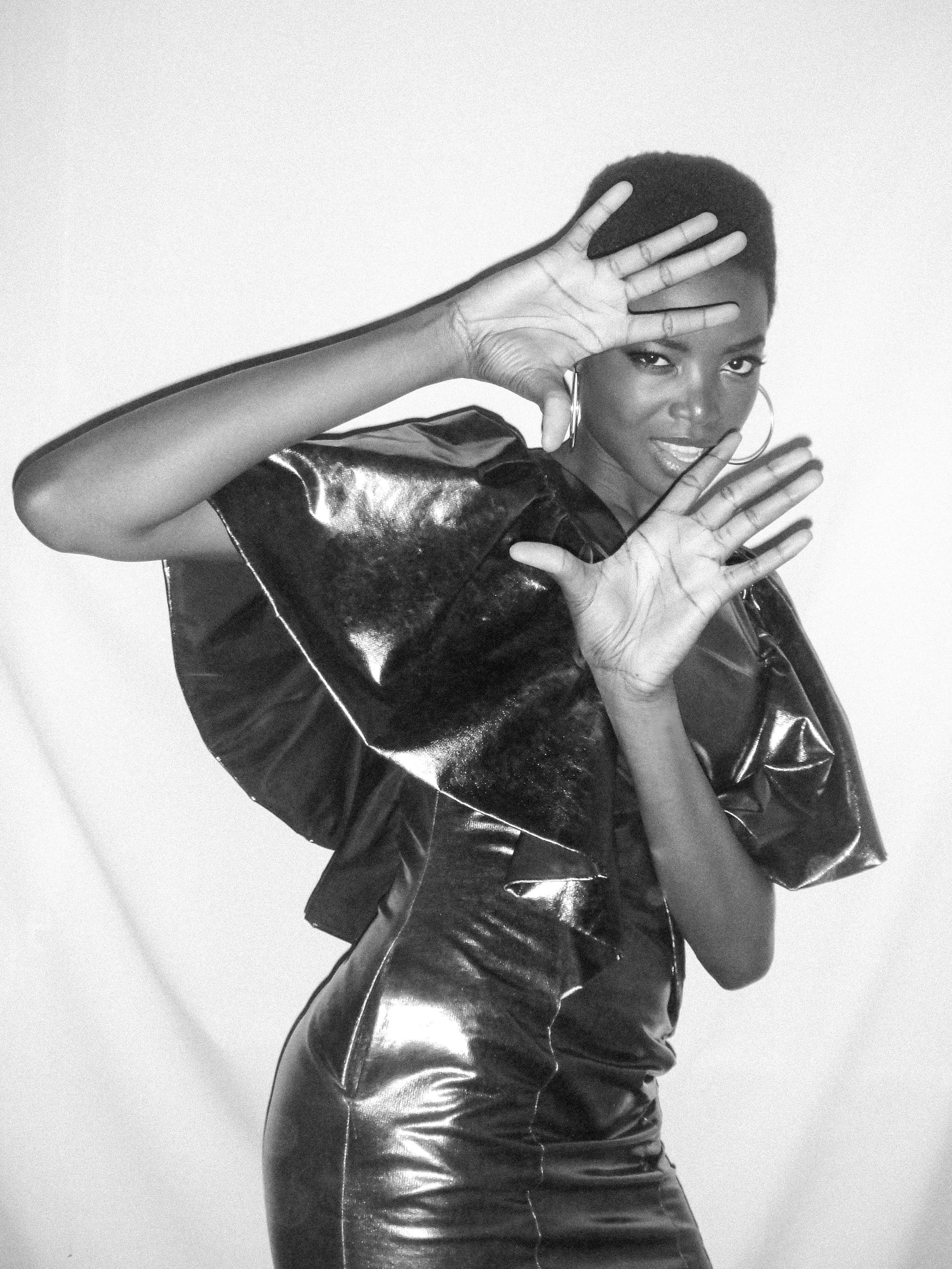What did you want to be when you were a kid?
I remember I wanted to be an archaeologist. I think that was due to my fascination with Egypt. I asked my parents more about it and they told me that there were still excavations, sphinxes and pyramids so I just became obsessed with it. I knew everything about Egypt on the tip of my tongue and I also remember that I was like 7 years old and all the other kids at school were playing football while I was reading the Tutankamon’s book.
After came Greece and then Rome and the main things that attracted me to that were the clothes and the images. I studied a lot. I saw many movies and their wardrobes and I was wowed with all of it. Then one day in my grandmother’s house I found fashion magazines and I started to find it interesting but not because of the clothes. I don’t remember the clothes. I was attracted to the photos, to the colors combination, to the stories and to taking that to the extreme.
Has fashion always been a passion?
Yes, I decided I wanted to work in fashion but at the time I wasn’t sure about what I wanted to do exactly. I did a fashion design course but I soon realized I wasn’t good enough for it because that was creativity at a different level. I’m creative but in other ways. If you want to be a designer you need to be a genius like Marques Almeida or Felipe Oliveira Baptista. You need to be one step ahead and I wasn’t. However that happened in the late 80s, early 90s where you didn’t have many job options in fashion. What I knew is that I liked to grab the past and throw it to the future.
After I finished my course I started to work as a model and let me tell you that I learned much more working as a model than while I was in the fashion design course. When I was working as a model I found out that there was a job in magazines where someone said “this is how the story is” and so I realized that was me. I used to call myself a fashion producer but that wasn’t the right term because the fashion producer is another person. That’s how I started.
How does your creative process work? Is it intuitive or does it involve something more complex?
In the way I work and in the way everyone else works there are things that are intuitive and there are others that are really well thought out. The foundation must be the moodboard, the story, but I only learned that later. However, when you’re making a story for a magazine you need to think about the trend you’re working on and imagine the characters in order to know how each character would behave and what they would like to wear or not. You can think for instance of an Italian movie from the 60s but you should bring it to the present and understand how the character is so you know for example which shoes that character would never wear. After you have this moodboard everything else is just details but obviously there are always things you need to improvise because of things like logistics.
Is it essential for you to travel and to know the world?
Yes, but I like to travel for leisure. Also the work trips I made were inspiring but most of all they were really helpful for me to realize that sometimes you just have to make decisions.
What excites you most about your job?
The people. There is no Chanel dress that can replace that. It helps of course to make a story but people are the main thing. The creative process is also one of the best things and the worst is the ending because people are usually just really tired. There is also a rush today to get things done. I don’t mind because I’m fast but sometimes the creative process implies that you need to be in front of a computer just doing research and things can pop up like “Ok so Giotto, the painter”, immediately after that other idea can surface until you get to the actual moodboard. But in Portugal that is not seen as work. You can’t just put someone against a wall in a Gucci dress and pretend that that is Vogue Italia because that has already been made.
I think one of the problems these days is that we get a lot of fast references made in a very recent past and that can be really dangerous because I think that the work of the fashion editor, of the creative director or whoever must be fresh new even if it’s tacky at the time.
I’m absolutely sure that when Alessandro Michele started to make his collections for Gucci it was a slap in everyone's faces because it was all cheesy but the truth is that he has revolutionized fashion in a way.
So far what have been the biggest challenges you have overcome at a professional level?
Definitely Vogue because at the beginning to have a Vogue magazine in Portugal in 2002 when there was no fashion and no clothes it was kind of crazy but at the same time thank God that happened because we were completely naive. At first after our first productions in Paris they used to ask me “Who is the booking’s editor? Who should I call?” and I said “Me.” and they answered “But you are the fashion director” so Vogue abroad is such a big machine that at the time for us to be involved in all that is quite exasperating actually.
There were times when I was alone at the hotel in Paris with packages of clothes and honestly I just felt like crying because there is so much pressure. Everything can happen, castings being canceled, we being in the middle of some show and someone telling us we need to return the clothes in 2 hours, me in the room without anything to shoot. It was insane. The first times were hard because I needed to figure out on my own how things should be done. I couldn’t ask anyone. There were humiliating situations of photographers telling me on a sarcastic way “Me? Working at Vogue Portugal? That would be funny” and on the other hand there were people who were really nice.
I’m telling this for the first time but at the beginning when I was in Paris there was even a day when I was thinking I don’t have money to do anything. Everyone is with vans and drivers doing things and I was by myself with only one assistant who vaguely helped me. So one day I went to Galliano’s showroom and it was so far and I was so tired that after that I just sat down on a bench in a garden and I stood there for like an hour. I only moved after my phone rang. The first 2 years were so overwhelming and it was for sure my biggest challenge but I also learned a lot so it was also really good. Every member of the team worked at the highest level and their eyes were all towards me. At first I didn’t do things because I was afraid. But then I realized that I just needed to follow my instinct in order for it to work and from the moment you have directions they start to respect you. They might not even like what you’re doing but they’ll say let’s go in that direction. Ultimately, my biggest professional challenge was Vogue, without a doubt.
How do you describe these 15 years leading Vogue and contributing so much to fashion in Portugal?
It’s been 15 years but the truth is it seems like everything happened yesterday. It was great but it is also hard when you want to do things but don’t have enough money to do it. Despite that, in general, it was really fun and I had moments that were truly amazing. I think that specially in this area work needs to be fun. I guess what’s happening now for me and my team is a well-deserved vacation because something that I can say and with pride is that me and my team have been pioneers and we have paved the way for everyone and everything that will come next.
What production did you like to do the most?
I’m not sure but the first one I did obviously because besides being my first production it was also with one of my favorite photographers of all times - Javier Vallhonrat. He is just great and I felt so overwhelmed. It was really special. We were in a forest in Paris. The theme was all white and the area was all illuminated and I remember thinking that "this is Vogue" and it’s another level with thousands of people being a part of it. It was unbelievable. Nowadays it’s not like that anymore. Maybe it might still be with some photography genius but not in general. Before we used to do productions in 2 or 3 days and now we mostly do it in one day. Also I actually don’t know if I would have the patience to do it in 2 days because now times have changed and 15 years ago it was all with polaroids, we didn’t have the digital technology we have now. The first years at Vogue just had that taste of a freshly baked cake out of the oven and so it was really memorable.
With who would you like to work and still haven’t had a chance?
With so many people. I really like new photographers because I enjoy getting a hold of that fresh side they have and that naivety that thank God I also maintained. So more than working with institutions what I like the most is working with people who still have that almost teenage background. To work in fashion and to do new things, otherwise it’s not interesting.
Which are the icons you most admire?
This is a cliché but in fact I have to say women. Diana Vreeland had a big role in revolutionizing things. She set the bar really high, she made fashion a fantasy and she made it fun. People are not aware of this but the structure of Vogue as we know it today was thanks to her. She created that. She created stories, she used to go to the desert to do a production and things like that.
I bought a book called Visionaire that was out once a year and it was really interesting because it showed internal letters in the 60s or 70s before emails existed. In that internal mail you could see letters she used to send to other people from Vogue saying “Why aren’t there freckles in this edition? I want it to be freckles.”, “I see a lot of girls wearing torn pants so why don’t you add that?” “I’m tired of pearl necklaces, we can’t use that. Do you think you’re working for your grandmother?”. And this is having a director because she was giving directions like that in the 60s.
My favorite photographer ever was Guy Bourdin because considering the era it was he completely revolutionized things. Today I think that there are good photographers but I think Terry Richardson is the only one with guts to truly do something different. Besides that you look at his work and you can see without a doubt that it is in fact his work. We can even think that the guy has a kind of perverted point of view but what’s the problem? Because then you see a lot of work from photographers like Mert & Marcus that are amazing but at a certain point it can be confused with Steven Klein’s work for example. With Terry Richardson that doesn’t happen.
In terms of models I like the older women and the ones that are not really on top of the top list but are still there like Guinevere and Malgosia that I was actually lucky to cast.
You talked about Terry Richardson and he has the simplest line so is there a style line that you like the most?
No, modesty aside, I’m very good at mixing things. In any shooting if I don’t have all the clothes that I need I’m really good at arranging things but that’s a crutch. Now I prefer other kinds of things and looking for challenges because I don’t have a style. I like everything as long as it pleases me. For example I like Versace, I like Comme des Garçons, I like everything that is good basically.
In general what is your view of fashion in Portugal?
I think that besides rare exceptions we are fools and we still have a lot to learn. We have a lot of preconceptions and there will only be fashion itself when we stop having those. And I’m talking about preconceptions related to everything, including the way people dress. I think that a fat woman in a leopard jumpsuit and high heels can be really inspiring. I think the absence of taste is the worst thing, bad taste is extraordinary. Nowadays I look and I see charisma and power in the suburbs, in the skaters, the graffiters. Much more than in the centre of Lisbon because there you see Gucci, Prada but there is no story behind it. It's just walking clothes and that is boring.
Professionally what do you feel you still need to accomplish?
So many things! I would love to do movies, to create an online magazine… I think that would be nice because I’m addicted to Dazed and obviously that is done but we here have a thing that is our Portuguese essence. Portugal is an amazing country and with an incredible potential so I think it should be an international magazine but with the Portuguese spirit. There is a wicked side in all of us but we never talk about it so it would have to be something to the world but with our identity, an identity we haven’t found yet.
Given that you really like Dazed and that it has a completely different line didn’t you feel a lack of freedom at Vogue?
Totally. Every day. I remember the idea I had of Vogue that in 1945 there was a woman named Lee Miller who was a model, editor and photographer and she did the fashion part on the English or French Vogue. She did impressive and beautiful but shocking photos of Auschwitz. Vogue was a magazine that mixed fashion with culture and with images that weren’t pretty. They were powerful and they made history.
Nowadays you have models like Gigi Hadid, Bella Hadid, Kendal Jenner. I think it’s a shame to go that way but this is just my personal taste. Obviously when you are working with a client like Vogue as much as you want to change things there is always a limit and I have to respect that because I’m not the magazine’s owner. So you need to be aware of the client for who you work and the freedom they give you. If you take risks the public might not like it at first if they see something different but if it’s just the same thing over and over again you’ll just toss the magazine in 2 seconds and never look at it again. There needs to be that surprise factor but not to shock. And that’s the hardest part – to make something that is surprising without shocking people.













